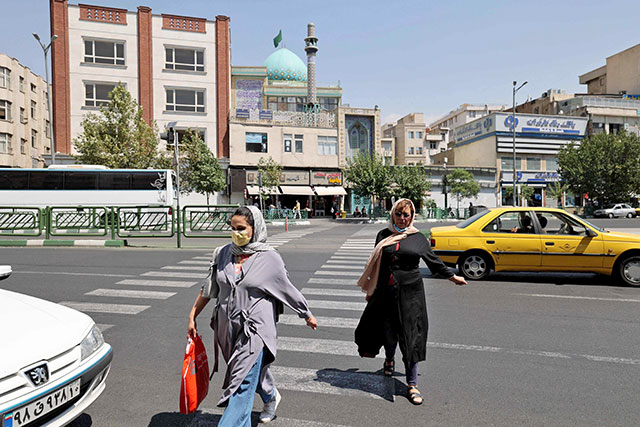TEHRAN — Iran sought to contain a new record surge in Covid cases, with government offices, banks and many businesses shut in the capital Tehran on Tuesday.
Already hit by the deadliest outbreak in the Middle East, the Islamic republic has been gripped by what authorities warned would be a "fifth wave" driven by the aggressive Delta variant.
To contain it, the national virus taskforce ordered government offices and banks in the Tehran and neighbouring Alborz province to close for six days from Monday evening, the first time such a step has been taken. Most non-essential shops as well as malls and cinemas were also shut. The sprawling capital city's streets had limited traffic with almost empty sidewalks on Tuesday morning, an AFP journalist reported.
Iran has so far avoided imposing a full nationwide lockdown, employing instead limited measures such as temporary travel bans and business closures. Mehdi, an employee at a trade company, was sceptical the restrictions would curb infections.
"It won't be effective," he told AFP. "If people stay at home and don't go anywhere, it might -- but as soon as there's a holiday, everyone starts travelling." Iran celebrates the Muslim Eid Al Adha holiday on Wednesday, ahead of the weekend.
State television showed traffic police blocking roads leading north to popular holiday destinations, but Iranian media reported heavy traffic as of Monday night as residents tried to leave the capital. Slow vaccine rollout
President Hassan Rouhani earlier this month warned of a "fifth wave" of infections, fuelled by the highly contagious Delta variant.
On Saturday, he blamed the rising numbers on crowds that formed during a June presidential election, as well as "unnecessary travel" and citizens flouting health protocols.
In the past 24 hours, the country of 83 million has registered a record 27,444 new infections, to bring its official total number of positive cases to 3,576,148.
An additional 250 coronavirus-related deaths took the total toll to 87,624, the health ministry said.
Authorities have previously admitted that the official figures do not account for all cases, but those numbers still make Iran the hardest-hit country in the Middle East.
Iran's previous daily infection record of 25,582 was reached on April 14. At the time Iran was battling a fourth wave that started in late March and was blamed on a surge in trips made during the Persian New Year holiday. The new restrictions include a ban on road travel to and from Tehran and Alborz provinces, and a new shutdown of high-risk businesses across Iran's worst-hit areas.
Iran has pinned its hopes on vaccinations to help combat the public health crisis, but its innoculation campaign since early February has progressed more slowly than planned.
Iran, strangled by US sanctions that have made it difficult to transfer money to foreign firms, says it is struggling to import vaccines. Just over 6.9 million people have received a first dose, and only 2.3 million have received the necessary two jabs, the health ministry said on Tuesday.
The authorities have approved the emergency use of two locally produced vaccines, with the only mass-produced one, COVIran Barekat, still in short supply.
Car mechanic Moslem said he believed vaccinations are the only real solution, but he bemoaned that it "is not being done".
